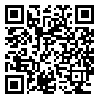Volume 14, Issue 1 (7-2023)
3 2023, 14(1): 11-19 |
Back to browse issues page
Download citation:
BibTeX | RIS | EndNote | Medlars | ProCite | Reference Manager | RefWorks
Send citation to:



BibTeX | RIS | EndNote | Medlars | ProCite | Reference Manager | RefWorks
Send citation to:
Talebi Z, Nejadhosseini Z, Nasiri H, Sanagoo A, Jouybari L. The Investigation of Academic Engagement and Its Relationship with Some Factors
in Nursing Students. 3 2023; 14 (1) :11-19
URL: http://ndhj.lums.ac.ir/article-1-379-en.html
URL: http://ndhj.lums.ac.ir/article-1-379-en.html
Abstract: (3062 Views)
Background and Objectives: Academic engagement, which is also referred to as student engagement, academic learning time, or academic engagement, is known as an important indicator of high-quality education. The purpose of this study is to investigate academic engagement in nursing students and its relationship to some other factors.
Materials and Objectives: This descriptive and cross-sectional study was conducted on 183 nursing students at Golestan University of Medical Sciences in 2018. Nursing students were enrolled in the study using convenience sampling. The data were collected using the Academic Engagement Questionnaire in three cognitive, emotional, and behavioral domains. The data were analyzed using SPSS 18 and descriptive and inferential statistics, including Mann-Whitney, Kruskal-Wallis and correlation tests, with significance level of p<0.05.
Results: The mean age of the participants was 21 years. According to the study results, the mean academic engagement of nursing students was 366.81 ± 70.96, which was at an average level. There was no significant correlation between academic engagement and age (p= 0.183) or academic performance (p= 0.196), but a significant correlation was found between ethnicity (p= 0.031) and being native with academic engagement (p= 0.001).
Conclusions: The academic engagement of nursing students was at an average level, and an increase in academic engagement was associated with an increase in academic performance. It is essential for nursing students to engage in student-centered activities in the cognitive, emotional, and behavioral domains of learning, and for nursing educators to use coherent and learner-centered teaching strategies.
Materials and Objectives: This descriptive and cross-sectional study was conducted on 183 nursing students at Golestan University of Medical Sciences in 2018. Nursing students were enrolled in the study using convenience sampling. The data were collected using the Academic Engagement Questionnaire in three cognitive, emotional, and behavioral domains. The data were analyzed using SPSS 18 and descriptive and inferential statistics, including Mann-Whitney, Kruskal-Wallis and correlation tests, with significance level of p<0.05.
Results: The mean age of the participants was 21 years. According to the study results, the mean academic engagement of nursing students was 366.81 ± 70.96, which was at an average level. There was no significant correlation between academic engagement and age (p= 0.183) or academic performance (p= 0.196), but a significant correlation was found between ethnicity (p= 0.031) and being native with academic engagement (p= 0.001).
Conclusions: The academic engagement of nursing students was at an average level, and an increase in academic engagement was associated with an increase in academic performance. It is essential for nursing students to engage in student-centered activities in the cognitive, emotional, and behavioral domains of learning, and for nursing educators to use coherent and learner-centered teaching strategies.
Type of Study: Research |
Subject:
General
Received: 2022/08/31 | Accepted: 2023/04/24 | Published: 2023/07/25
Received: 2022/08/31 | Accepted: 2023/04/24 | Published: 2023/07/25
| Rights and permissions | |
 |
This work is licensed under a Creative Commons Attribution-NonCommercial 4.0 International License. |





